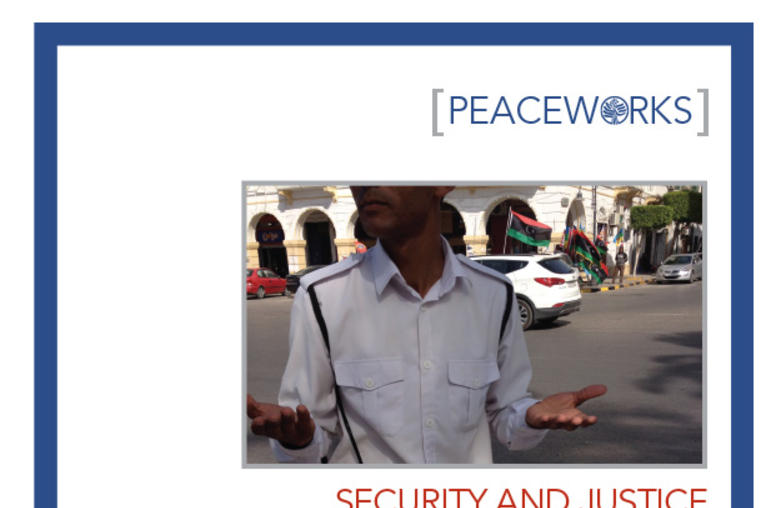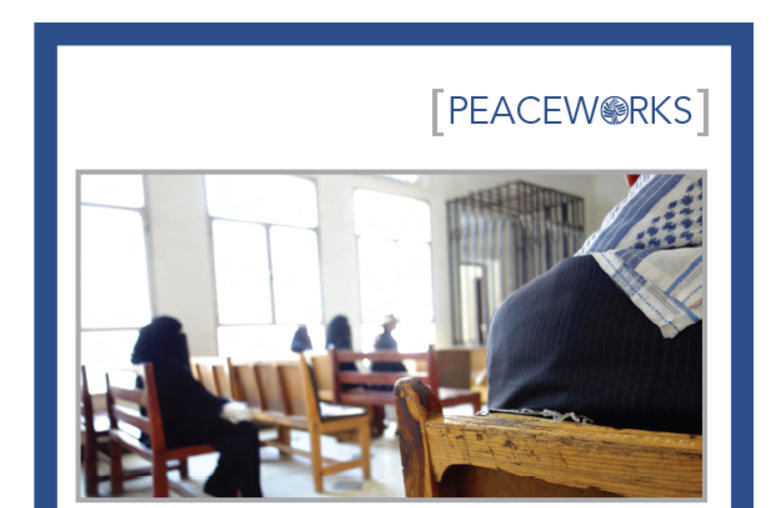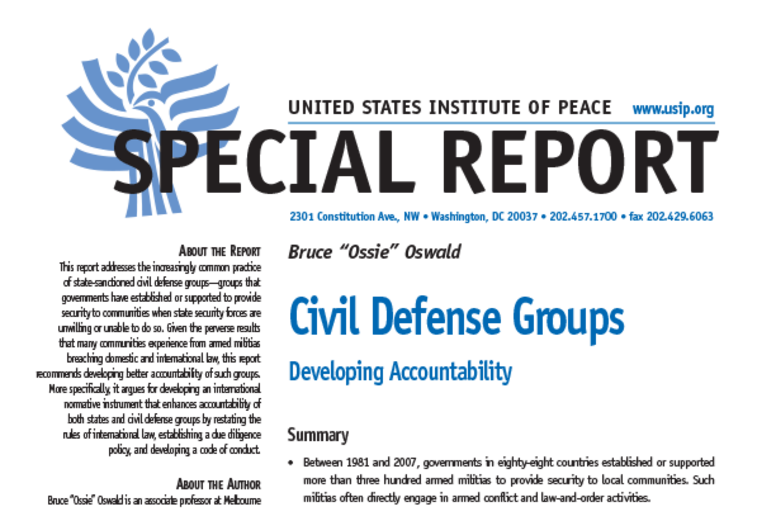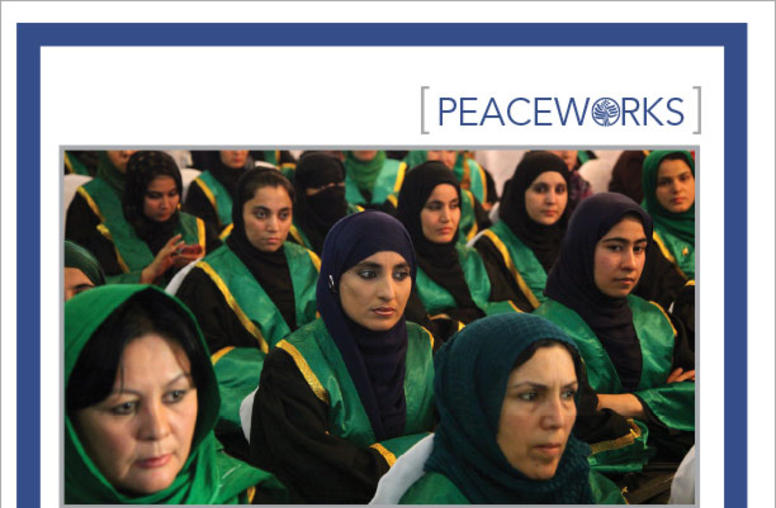Laws of War
An American Red Cross survey released this spring shows that 59 percent of American youth believe there are times when it is “acceptable” to torture the enemy. And only one in five American youth is familiar with the Geneva Conventions, last revised in 1949, that define the way civilians and military personnel are to be treated in war.
June 7, 2011
RULES OF WAR 10 YEARS AFTER 9/11: NOW WHAT? – An American Red Cross survey released this spring shows that 59 percent of American youth believe there are times when it is “acceptable” to torture the enemy. And only one in five American youth is familiar with the Geneva Conventions, last revised in 1949, that define the way civilians and military personnel are to be treated in war. Such statistics show the profound need to educate all Americans but particularly youth on the rules of war, says USIP’s Colette Rausch, director of USIP’s Rule of Law Center of Innovation. “It’s important for us to take a step back when we’re working with students, to explain why this is critical,” she said. “It’s so important that we educate them.”
WHY AMERICAN CHARACTER IS IMPORTANT – A conference at USIP June 3 created a forum for a candid discussion on international humanitarian law and rules of war premised on the results of the Red Cross survey which Rausch called “startling.” Two officials from the Pentagon, a representative from the Red Cross and a professor of law at Columbia University discussed the importance of the American character when it comes to the laws of war, especially after a decade of fighting in two – and now three – wars. “Have we always lived up to [our stated commitments]? No. But is this what defines us as we form a more perfect union over time? Yes,” said Rosa Brooks, special coordinator for the Defense Department’s Office of Rule of Law and International Humanitarian Policy. “This is about who we are.”
ABU GHRAIB: STILL HAS IMPACT – The U.S. government, the military, State Department officials, other policymakers and academics have given much thought to how to improve the American image overseas when it comes to perceptions and realities of the way the U.S. treats detainees. This is still especially true after the Abu Ghraib episode came to light early in the Iraq war in 2004. Those events still define the way the international community perceives the U.S., said another panelist, William Lietzau, the deputy assistant secretary of Defense for detainee policy. Lietzau was reminded of this on a recent trip overseas he visited the headquarters of al-Jazeera in Qatar. In the network’s offices are display cases featuring the American detention facilities of Abu Ghraib in Iraq and Guantanamo Bay in Cuba. And in Afghanistan, the British maintain a separate detention facility only about 100 yards from a similar American facility. Why? Because the perceptions of the U.S. and its treatment of detainees still lingers. “The impact is huge,” Lietzau said.
That’s why the U.S. and other nations must continue to always pledge to do better because it goes to the fiber of a nation’s being. “If you’ve lost all your possessions, you’ve lost nothing, if you lose your health, you’ve lost something,” said the Pentagon’s Lietzau. “If you lose your character, you’ve lost everything.”
CAN THE U.S. BE A LEADER ON HUMANITARIAN LAW? – Yes, says the Pentagon’s Rosa Brooks. “We’ve had our ups and downs, but the overall trend is a good one,” she said. The International Criminal Court (ICC), which the U.S. has yet to join, is still a “very, very valuable tool” for bringing perpetrators to justice, Brooks said. But the U.S. has always had issues with aspects of the Rome Statute of the International Criminal Court that established the court and its jurisdiction structure. Yet the U.S. has quietly aligned itself more and more with the ICC. Even during the last administration, the U.S. has “pushed closer” to supporting the court, and through frequent interaction has found that it’s an effective body -- even if the U.S. won’t likely join it anytime soon. “I don’t think it affects our standing as a leader in international humanitarian law,” Brooks said.
DOES KILLING BIN LADEN CONTRADICT HUMANITARIAN LAW? – Columbia’s Matthew Waxman said that because the U.S. is essentially in a “continuing state of armed conflict,” the U.S. can legally target with lethal force members of the enemy force, including the chain of command. “And Osama bin Laden would represent the apex of that hierarchical command chain,” he said. “As a matter of targeting law under international humanitarian law, he is subject to targeting.”
GAPS IN GENEVA CONVENTIONS? – The Conventions, last revised in 1949, are based on conventional warfare that largely assumes state-versus-state conflict. But explicit rules for how enemy combatants are detained, for example, haven’t been written, said Lietzau. The gaps can create the perception that the U.S. is necessarily in violation of an article when in reality the language is vague or not necessarily applicable. That is especially true when the U.S. or other coalition members confront non-state actors, insurgencies and attacks on computers, not people. “We can’t always expect that there is a law that governs what we’re doing,” Lietzau said.
STRENGTHENING THE LAW – But the remaining gaps in international humanitarian law still leave areas vague or ill-defined and need closing, says the Pentagon’s Brooks. But it will take time to narrow that gap between where the laws are now and where they need to be, she said.. “I think the gap is between our ambitions to reduce suffering of civilians and what we’ve actually been able to achieve… we have a long way to go,” she said. The real challenge in the coming decade, she said, is to try to “reduce that enormous gap between the reality of tremendous human suffering and what we have on paper.”



